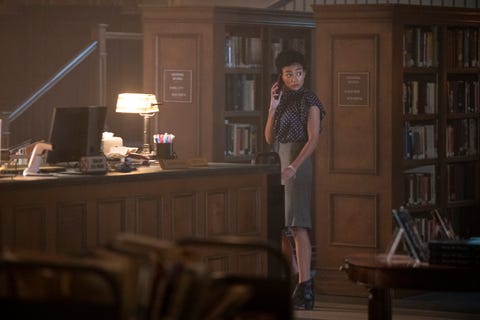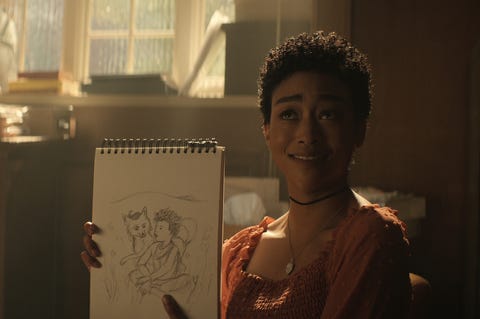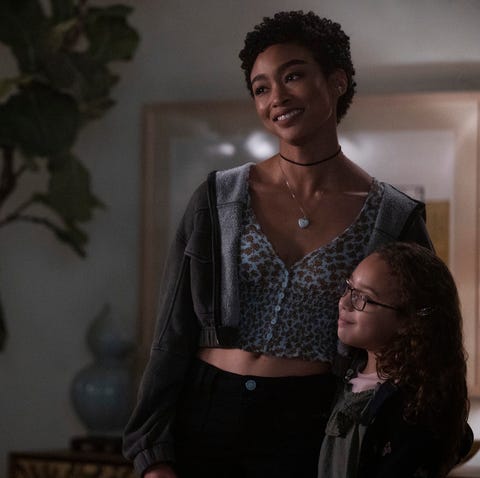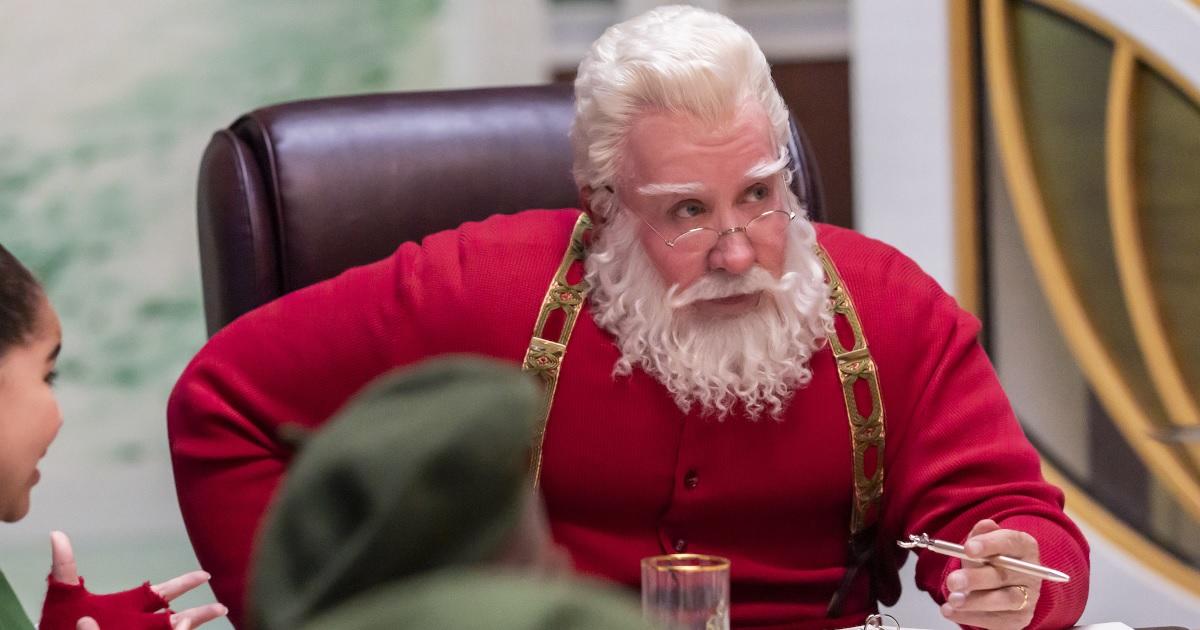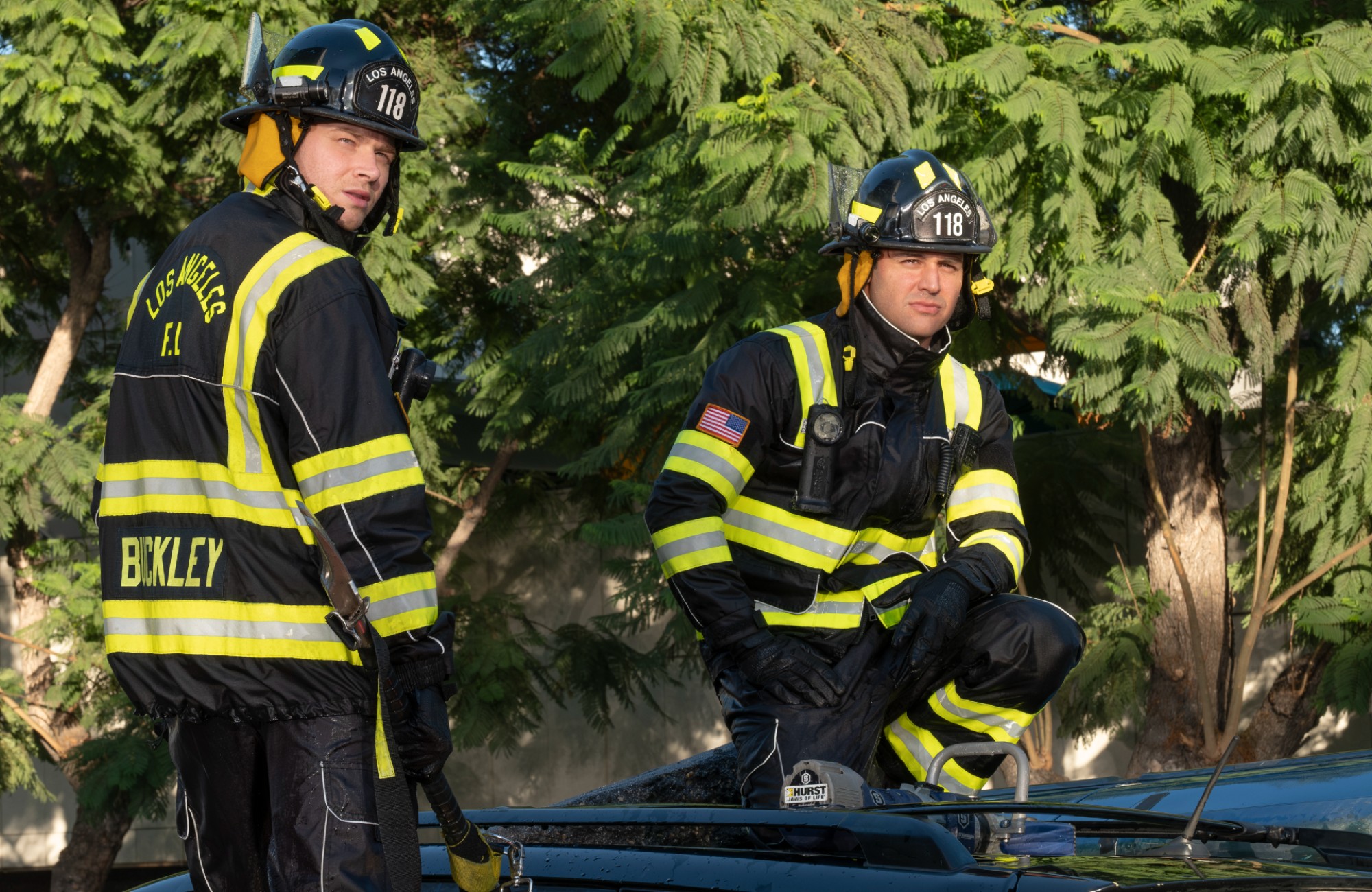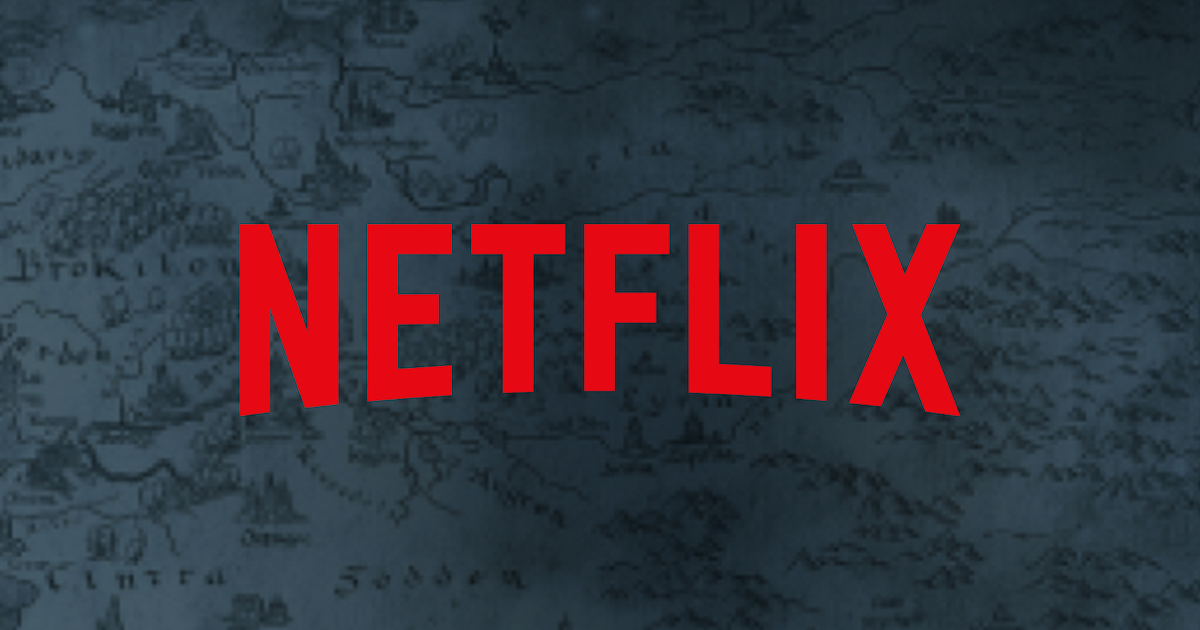Tati Gabrielle’s Marienne Is About to Become Your New Favorite on You
Big spoilers for You season 3 ahead.
The first time Tati Gabrielle appears on You, she’s striking. Not just because she has a radiant, calming presence (and her voice is soft as butter) but also because an unfortunate realization hits: Oh no, is this Joe Goldberg’s next victim?
The protagonist of the Netflix series, played by Penn Badgley, has a seasons-long streak of charming women, stalking them, killing them, and trying to clean up the mess. A mysterious local librarian like Gabrielle’s Marienne could be an easy target for the bookkeeper-turned-murderer. But luckily, she is safe after her initial encounter with Joe. After all, he’s married now to Love (Victoria Pedretti) and is a father to their infant son, Henry. He can’t be pursuing murderous impulses now, right? …Right?
Watching the full third season (or reading the rest of this story) will reveal whether Marienne makes it out alive, but our concern over whether she does says a lot about Gabrielle’s performance. Marienne is likable; she’s level-headed and kind. You don’t want to see her lose—not only to Joe, but also to her ex-husband, whom she’s fighting for custody of her child, or in her battle as a recovering alcoholic.
Gabrielle, best known for appearances on Netflix’s Chilling Adventures of Sabrina and The CW’s The 100, was eager to tackle the nuanced role. Perhaps what helped spark that enthusiasm was her background as a “huge fan” of You. “I loved it from season one all the way through,” she says on Zoom from New York. Joining the production, and talking to creator Sera Gamble and director Silver Tree, only further elevated her opinion of the show. “It made me appreciate so many things so much more, and understand things even on a deeper level.”
Gabrielle chatted with ELLE.com about getting into character and working with Gamble and Tree to tweak the script to reflect her reality as a Black woman.
When you first got the role, how much did you know about Marienne and her storyline?
Through my auditioning process, they told me just a little bit, essentially. We were playing my race, which I was very happy about. And then once I got the role, they did give me the whole rundown of the season but they gave me the main points of, you know, she’s a librarian, she is a recovering addict, and she is fighting for the custody of her child. All three of those things, I was like, “Wow, okay. Let’s tackle it.”
As an actor, what was your approach to the character?
My previous roles were all in fantasy, and so this was my first time being able to play a “real-life” person. I just wanted to make sure that Marienne was grounded and try to separate her—excuse my French—bitchiness from, like, Prudence’s [the character she plays on Chilling Adventures of Sabrina] bitchiness, and just find ways to subtly bring out, especially from the addict point of view, what that means for somebody—what tics or things would come through in their day-to-day life that could be telltale signs to people who were aware. I got in touch with a friend of my manager; she was a mother who was a former addict and had her child taken from her. And so I wanted to really understand what that means to a mother because, of course, I’m not a mother and a little far away from it. I didn’t feel that, as my 25-year-old self, I could just try to do that and say, “Yeah, this is it!” and not have some insight from somebody who’s actually been through that.
Marienne is guarded at first with Joe, but she eventually lets her walls down and they start an affair. How did you work with Penn on portraying their complicated relationship?
We just had a lot of conversations. I appreciated Penn so much and we became really cool, and really close while we were on set. It was a lot of questions between the two of us, especially, “Do you feel this is right?” A lot of it too is just, we flowed well. And we both knew what each of our characters’ intentions were, we both knew what Sera needed and wanted.
The scene that touched me the most was the scene that she shares with the Love in the finale, where she’s talking to her about realizing she deserves better. They barely even know each other, but it strikes a chord. That line was strong, did it resonate with you as well?
Absolutely. Shooting that scene just in general, I remember having a lot of conversations with Silver about it. Especially in this world, having a conversation between two women and them trying to be like, one trying to save the other, the other one trying to empower. Even as you were talking about it, it brought me chills and a bit of tears to my eyes. ‘Cause we need that. We need more of that in shows like this or just in TV, film in general. I can’t even say more than that. It filled my heart with a lot of joy, a lot of hope.
And what was it like filming that scene with Victoria? It seemed very intense.
It was amazing. It took a couple hours. I loved working with Victoria because she was very in the emotional weight of that scene. She’s very giving and we were very much playing off of each other, and doing something a little different each take. It was awesome working with her, and I was happy that I got the chance to, ‘cause most of the season I wasn’t able to. So, yeah. It was beautiful.
There’s a line where Marienne also says that she’s drawn to toxic men or toxicity; how did you feel like that played into her character?
Where that struck for me was in the form of being an addict, or just experiencing trauma in general, especially as a child. I had developed my own sort of backstory for Marienne and where she came from, who her parents were. And when you don’t have a good example, it’s very hard for you to know what the best thing looks like or what you’re supposed to have. It’s hard for you to see the signs of red flags in that way. … How do I even put this into words? I guess that toxicity is part of the reason she became an addict, of feeling that she’s not worth it, that she doesn’t deserve whatever. And it’s just a perpetuating cycle. So I love that we put that in there and that Sera wrote that as a way of showing that Marienne is aware of herself, despite the fact that she’s recovering and trying to be a better self.
Another part that stuck out to me was earlier in the season, when Natalie (Michaela McManus), who was killed by Love and Joe, first goes missing. Marienne points out that America has a “missing white woman syndrome,” and “the white ladies deserve to be rescued and the rest of us can fend for ourselves.” Coincidentally, that was in the news recently, especially with the Gabby Petito case and Indigenous women bringing up how missing women from their own community don’t receive the same media coverage. How did that line strike you?
It struck me a lot because for the Black community, it wasn’t new. And, I mean, the show’s coming out at a great time to be able to make commentary on this, but it’s definitely something that’s very much not new. And I remember that the line was originally written to say, I think it was like, “the rest of them have to fend for themselves.” And I asked [Sera] and Silver, like, “Can I say ‘us’?” Can I include myself in this? Because it doesn’t make sense for me, as a Black woman, to refer to…and the passion Marienne has in saying it, and the way she bites back at Joe for it, clearly this touches her too. And it has touched Marienne with [her ex-husband] Ryan and everything that she’s been [through]. They don’t listen to her, they always listen to him. So it very much struck a chord with me.
Were there other parts in the script or in the direction where you were able to step in that way too?
I was very thankful to Sera and Silver for being so open to communication. And if there were, Sera was very adamant about being culturally accurate and honoring my ethnicity the best that she could. I just remember a few moments where it was like, “Can we talk about this?” Or “I don’t feel that as a Black woman, I would do this, or I would say this,” and Sera was always very receptive. And we’d work it too, so that we could still move the story the way that we needed to move the story but still honor me and my community in a truthful way.
At the end of the season, Marienne leaves. What do you hope she’s off doing?
I hope that her and [her daughter] Juliette do go to Paris and sit drawing outside the Sacré-Cœur. I hope that she finds the life that she’s been longing for and finds the peace that she’s been craving.
If we were to get more of Marienne in future seasons, what do you imagine that would look like?
I would love to see the new life that she has created for herself. I would love her to, I don’t know, find a way to expose Joe? I would love to see a time jump and see how Marienne and Juliette are when Juliette’s a teenager.
Marienne is a librarian. Are you a bookworm as well?
I can’t say that I’m as much of a bookworm as Marienne, I can’t lie on that, but I do like to read. My favorite book is The Unbearable Lightness of Being by Milan Kundera, which is actually in the show. Joe is reading it, I believe in the episode where Joe and Marienne’s thing starts, which I thought was just trippy.
Do you have a book recommendation, or the last thing you read that you love?
I read a lot of spiritual, self-help books because I like them; they’re very empowering to me. The Alchemist is always a good one, but I know everyone always lets that be their rec.
Right now I’m actually reading…My uncle wrote a book at the end of his life, like a romance novel. I was very young when he died and so it’s very trippy to see where his head was at the time. It’s called The Yellow Daffodil.
This interview has been edited and condensed for clarity.
This content is created and maintained by a third party, and imported onto this page to help users provide their email addresses. You may be able to find more information about this and similar content at piano.io

